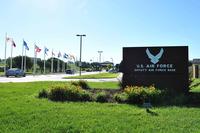
Ward posted a very thoughtful commentary on Military.com yesterday that I thought all of you who are fans of the Bossman might like to take a look at...
In the last pre-presidential election poll Military.com ran earlier this week, 78 percent of our readers picked John McCain over Barack Obama. In a poll conducted the following day, the leading answer to the question "What issue was the most important to you as you voted for president" was "the economy" (39 percent) even more important than "the wars" (32 percent). Juxtaposing these two polls not only yields one of the answers to how Obama won the election, it also shows the degree to which Americans, even Americans with war fighting experience, are convinced Jihadist elements are no longer an imminent threat.
On the morning after the election the pundits sum up the results with the idea that Barack Obama's victory is one of hope over fear. And assuming that's true, the ability for a people to carry that out is a luxury that shouldn't be taken for granted.
Contrast this presidential election with the one held four years ago. The year 2004 has faded as a distant memory now, but think back: That the Rovian-style political operatives were able to leverage fear in Americans to win a second term for George W. Bush says more about the fact that Americans were actually scared at that time than it does about the hired guns ability to affect outcomes at will.
In 2004 the Iraq War was going poorly. Casualty rates were high. The insurgency was proliferating. Al Qaeda was blooming in new places, and Bin Laden and his confidants were releasing messages at a regular clip. Major European cities were weathering terrorist attacks.
America wasn't scared because Karl Rove told it to be. America was scared because the times were scary to the degree that the majority of voters feared a change at the top. Four years later not only has that fear faded, it is all but gone from the national consciousness.
That fear started fading the minute George W. Bush stopped staying the course. It continued to fade with the removal of Donald Rumsfeld as secretary of Defense (an effort we might forget was championed by John McCain) and the appointment of Gen. David Petraeus as the commander of the multi-national force in Iraq. It faded with the Anbar Awakening and other tribal gains facilitated by counter-insurgency experts and great military figures like Army Col. H. R. McMaster and Marine Capt. Seth Moulton. And it faded with the decision of an obdurate commander-in-chief who elected to "double down" in the face of conventional wisdom and the advice of his military leadership and implement the Surge.
And this trend was underwritten by the efforts of the men and women of the U.S. military and their families efforts not just in Iraq but in a refocused Afghanistan mission and in troubled places like the Horn of Africa, the Balkans, the Korean Peninsula, and the all the world's oceans. Since hostilities began with Operation Enduring Freedom in the fall of 2001, members of the all-volunteer force have repeatedly gone into harm's way for upwards of 15 months at a time. Their efforts allowed a majority of voting Americans to feel, as Election Day exit polls indicated, that the wars are all but over. And that sense suppressed fear and afforded hope.
Let's allow the pundits their thesis. Hope won over fear this week, and that's good. We should strive to always be a nation of hope. Hope brings out our better nature as a people and makes us a rightful example to the rest of the world. So here's to hope the hope of which third-world refugees at gunpoint can only dream. This hope fuels the way forward, a new direction full of promise and buoyed by optimism. But as we fervantly celebrate hope on talk shows, on campuses, in the streets, and on our Facebook pages, let's be mindful of what it took to create it.
-- Ward









